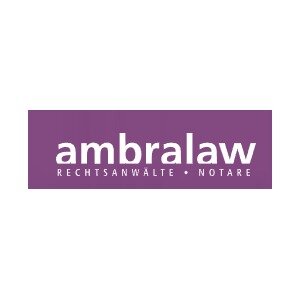Best Tax Increment Financing Lawyers in Bern
Share your needs with us, get contacted by law firms.
Free. Takes 2 min.
List of the best lawyers in Bern, Switzerland
About Tax Increment Financing Law in Bern, Switzerland
Tax Increment Financing (TIF) is a financial tool used by municipalities in Switzerland, including Bern, to stimulate economic development in specific areas. It allows local governments to invest in infrastructure and public services by borrowing against future tax revenues expected from increased property values. TIF aims to revitalize areas that otherwise would struggle to attract private investment. In Bern, TIF is regulated under local municipal laws and aligned with federal guidelines, ensuring that the development projects funded by TIF meet public interest objectives and comply with long-term urban planning strategies.
Why You May Need a Lawyer
Engaging a lawyer for Tax Increment Financing matters in Bern may be necessary for several reasons. Businesses looking to benefit from TIF incentives need legal guidance to navigate the complexity of applications and compliance requirements. Property owners might seek to understand the impact of TIF on property taxes or potential benefits from future infrastructure improvements. Investors and developers often require legal advice to structure their projects in accordance with TIF regulations. Additionally, legal expertise is vital for resolving disputes involving TIF agreements, ensuring fair allocation of tax increments, and protecting community interests.
Local Laws Overview
The local laws in Bern governing Tax Increment Financing are embedded within broader frameworks of urban planning and financial management. Key aspects include the defining boundaries for TIF districts, approval processes for development projects, regulations on how incremented taxes are calculated and used, and provisions for transparency and accountability in TIF fund management. Laws also indicate the criteria for eligible projects, emphasizing sustainable development and community benefits. It is crucial for stakeholders to understand these regulations to ensure compliance and optimize the advantages TIF offers.
Frequently Asked Questions
What is Tax Increment Financing?
Tax Increment Financing is a public financing method used to support redevelopment, infrastructure, and other community-improvement projects, funded through future increases in property tax revenues.
How does TIF work in Bern?
In Bern, TIF involves designating a specific area as a TIF district, where projected increases in property tax revenues are channeled into funding development projects within that area over a defined period.
What types of projects are eligible for TIF funding?
Projects eligible for TIF funding generally include infrastructure improvements, public utilities, environmental remediation, affordable housing developments, and other initiatives that promote economic growth.
Who decides on the implementation of TIF projects?
The implementation of TIF projects in Bern is typically decided by municipal authorities, often in collaboration with stakeholders including local businesses, residents, and urban planners.
Can TIF affect my property taxes?
While TIF itself doesn’t raise property taxes, it may influence the valuation of properties within a TIF district due to improved infrastructure and amenities, potentially impacting tax assessments.
Is there a public input process for TIF projects?
Yes, there is usually a public review and input process for proposed TIF projects to ensure they reflect community needs and priorities before they are approved by municipal councils.
How are TIF revenues tracked and used?
TIF revenues are meticulously tracked and are legally restricted to be used for the specific purposes defined in the TIF district plan, ensuring accountability and proper use of funds.
What are the risks of TIF?
Potential risks include over-reliance on future tax increments that may not materialize, mismanagement of funds, or projects that do not deliver anticipated community benefits.
Can TIF be challenged legally?
Yes, stakeholders can challenge TIF projects or district designations through legal channels if they believe procedural errors occurred or the projects are not in the public interest.
How can I stay informed about TIF projects in Bern?
Stay informed through municipal websites, local government announcements, and participating in public meetings related to urban development and financial planning in Bern.
Additional Resources
For more detailed information on Tax Increment Financing, consider consulting the following resources: the Bern Municipal Office for Urban Development, Swiss Federal Department of Finance publications, and legal firms specializing in municipal finance. Community advocacy groups may also provide insights and updates on local TIF projects.
Next Steps
If you require legal assistance in Tax Increment Financing in Bern, consider initial consultations with legal experts specializing in municipal finance or urban development law. Prepare to present your specific concerns or objectives to the lawyer for tailored advice. Additionally, engaging with community stakeholders and attending local government meetings can provide further insights into TIF-related matters in your area.
Lawzana helps you find the best lawyers and law firms in Bern through a curated and pre-screened list of qualified legal professionals. Our platform offers rankings and detailed profiles of attorneys and law firms, allowing you to compare based on practice areas, including Tax Increment Financing, experience, and client feedback.
Each profile includes a description of the firm's areas of practice, client reviews, team members and partners, year of establishment, spoken languages, office locations, contact information, social media presence, and any published articles or resources. Most firms on our platform speak English and are experienced in both local and international legal matters.
Get a quote from top-rated law firms in Bern, Switzerland — quickly, securely, and without unnecessary hassle.
Disclaimer:
The information provided on this page is for general informational purposes only and does not constitute legal advice. While we strive to ensure the accuracy and relevance of the content, legal information may change over time, and interpretations of the law can vary. You should always consult with a qualified legal professional for advice specific to your situation.
We disclaim all liability for actions taken or not taken based on the content of this page. If you believe any information is incorrect or outdated, please contact us, and we will review and update it where appropriate.















